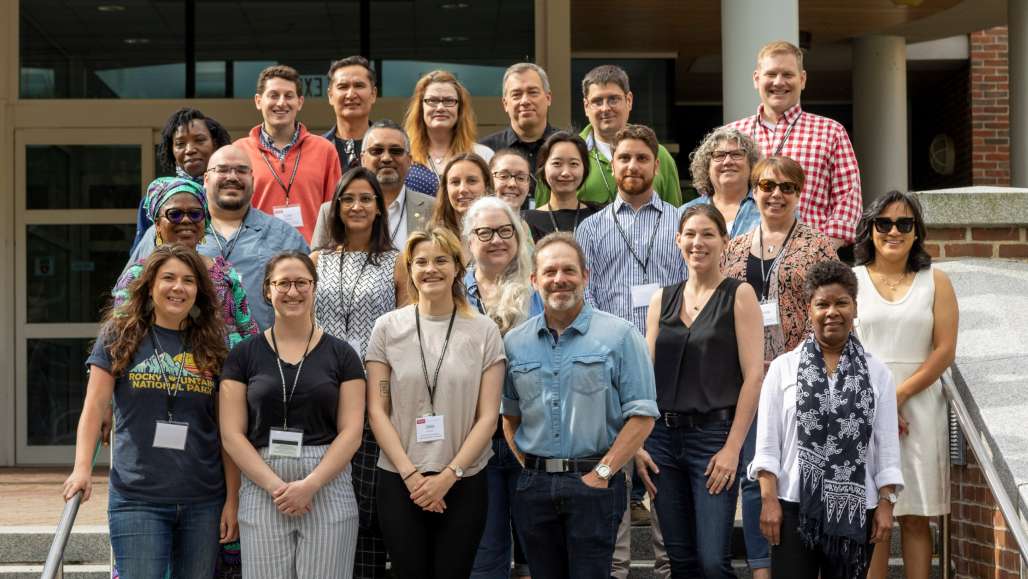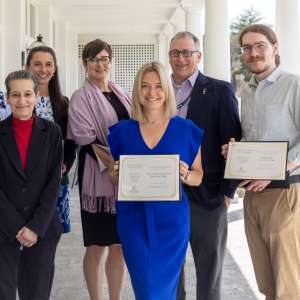Genocide Prevention Education a Shared Pursuit at Summer Institute

The fourth edition of the Keene State Summer Institute on Genocide Studies and Prevention featured 20 participants from higher education, in the United States and abroad, with diverse expertise and backgrounds.
The five-day residential summit, led by Jim Waller, Cohen Professor of Holocaust and Genocide Studies, concluded June 10. It drew on a range of global historical case studies and current crisis spots. With a focus across all phases of the conflict cycle, Waller said, the focus of the group’s week-long study and networking was genocide prevention.
Previous Summer Institutes were in 2021, 2018 and 2016.
“We’ve now educated 80 individuals –– university faculty, non-governmental organization administrators, and museum educators –– from more than 20 countries,” said Waller, who facilitated a Capstone Simulation titled “Genocide and Atrocity Prevention in Action” on the concluding day.
The study of genocide prevention and response is relatively new and growing all the time. We’re already building a network of support for our collective work moving forward. I came away from the week re-energized and inspired. It helped me return to the ‘why’ about my work.
– Kate English, executive director for the Educator’s Institute for Human Rights
This year’s simulation explored current risk factors in Bosnia-Herzegovina and strategies for reducing those risks, Waller explained. Participants were assigned various roles, and as the simulation progressed, Waller injected a new crisis or flashpoint that forced participants to have to react and pivot to a fluid situation.
“Overall,” Waller said, “the simulation allowed participants to apply principles they learned regarding risk factors, how to address them, and how to respond to an escalating crisis.”
Participants this year brought with them lived experiences in other at-risk countries, including Cameroon, Northern Ireland, and India, he said. In all, Waller noted, more than 75 people applied for one of the 20 spots.
“I was, as I always am, struck and humbled by the real-time applications of what the Institute focuses on,” Waller said. “The Institute pushes us to bring the lessons of history into the present. And the presence of such diverse participants –– from Nepal, Bangladesh, Cameroon, India, Canada, Burundi, Israel, Argentina, Kyrgyzstan, and elsewhere –– brings a remarkable set of perspectives to the week.”
Dr. Nchotu Veraline Minang, head of the department of public law at the University of Bamenda in Cameroon, said she will waste little time restructuring her international law class when she returns to her homeland.
“This has been a great opportunity to get more knowledge on prevention,” she said. “The war and the war crimes in my country are under-reported and the war didn’t just break out. All the risk factors were there.”
Cameroon is a country in central Africa. Its 89-year-old leader has shunned all calls for a federal structure in his nearly four-decade rule, provoking an ongoing separatist response and resulting violence.
The United Nations and NGOs have accused the rebels and security forces of committing crimes against civilians.
One think tank, the International Crisis Group, estimates that the conflict has killed thousands, mostly civilians, and forced more than one million people to flee their homes.
“We need a three-pronged approach, I think,” Minang reflected last week in Keene during a break in the program. “One, increasing research to educate more people and allow more people to coalesce. Two, expand diplomatic channels; we cannot do anything without getting government on board. It must have a listening ear. Three, we need grassroots, communal dialogue. We need to hear about the divisions we have in our societies.”
Minang added: “I am also traumatized (by the conflict). Just talking about it here, like this and with others (this week), allows me to feel a little relieved.”
Kate English, executive director for the Educator’s Institute for Human Rights in Washington, DC, is an 18-year secondary classroom veteran, now working with teachers around the world to end hate. Her organization, she said, supports communities recovering from violent conflict.
“I’ve been learning and teaching about genocide prevention, response, and building sustainable peace for about 10 years,” she said “I’m not a scholar, though, so it can be difficult to keep up with information and research. The (Keene State) Institute brought much greater depth to my work and filled in gaps of knowledge I’ve been working to catch up on for some time.
“Beyond that, and perhaps most importantly, the Institute brought together an incredible cohort of participants and speakers. We gained an immeasurable amount from one another.”
Attendees who complete the Institute join educators that serve as leaders in Holocaust and genocide education in their academic institutions, communities, and professional organizations, Michele Kuiawa, the Center’s senior program support assistant, said.
“We want those who come to take what they learn back to their home institutions,” Kuiawa said, “to start a certificate program, a class, a club. We want them to replicate this. Keene State should not be the only school that has a program of study on this important topic.”
“It is always interesting as I watch these individuals form friendships,” she added. “I know they will stay in contact and rely on each other. They are like-minded people, and they get re-energized by coming together this way.”
Added English: “The study of genocide prevention and response is relatively new and growing all the time…We’re already building a network of support for our collective work moving forward. I came away from the week re-energized and inspired. It helped me return to the ‘why’ about my work.”
A Summer Institute for high school teachers and facilitated by Tom White, the coordinator for educational outreach at Keene State’s Cohen Center, is next month at Keene State.
The Charles E. Scheidt Family Foundation funds the Waller-led Summer Institute.





